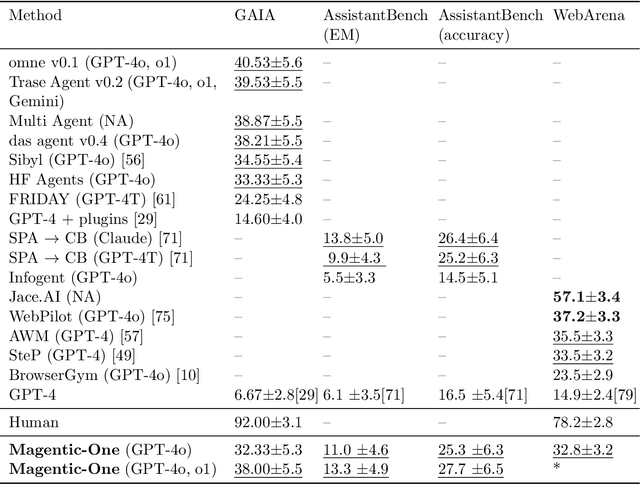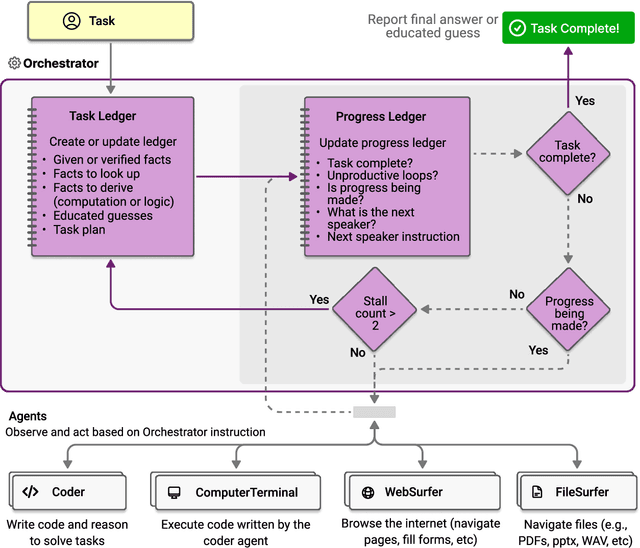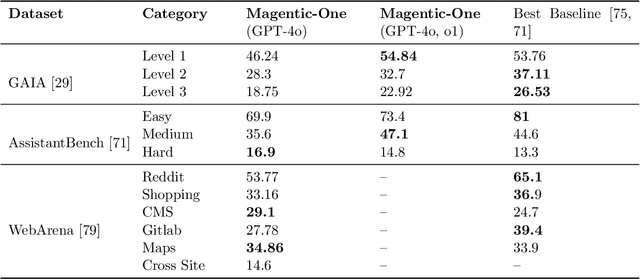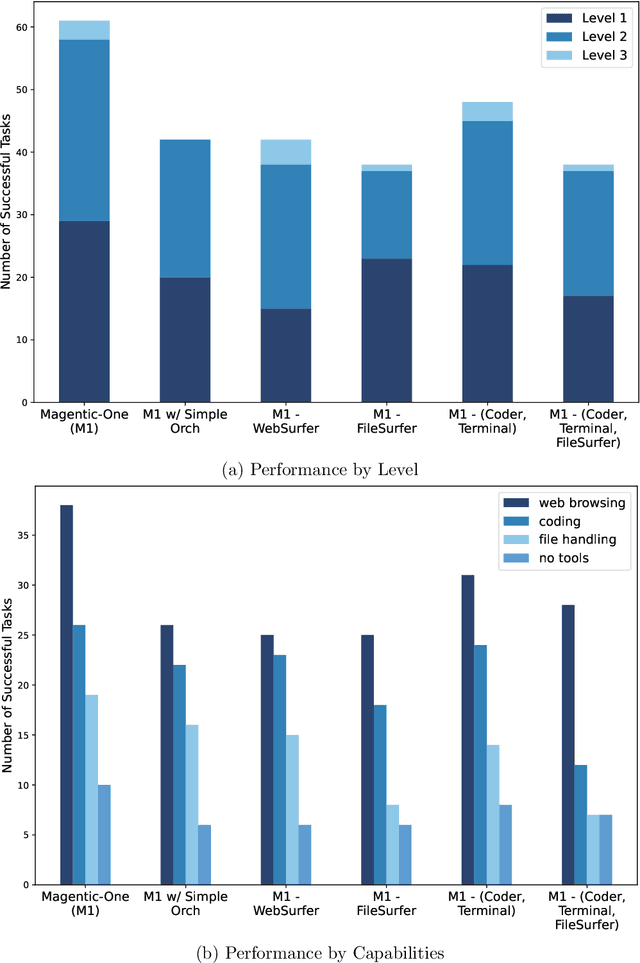Peter Chang
Shammie
Magentic-UI: Towards Human-in-the-loop Agentic Systems
Jul 30, 2025Abstract:AI agents powered by large language models are increasingly capable of autonomously completing complex, multi-step tasks using external tools. Yet, they still fall short of human-level performance in most domains including computer use, software development, and research. Their growing autonomy and ability to interact with the outside world, also introduces safety and security risks including potentially misaligned actions and adversarial manipulation. We argue that human-in-the-loop agentic systems offer a promising path forward, combining human oversight and control with AI efficiency to unlock productivity from imperfect systems. We introduce Magentic-UI, an open-source web interface for developing and studying human-agent interaction. Built on a flexible multi-agent architecture, Magentic-UI supports web browsing, code execution, and file manipulation, and can be extended with diverse tools via Model Context Protocol (MCP). Moreover, Magentic-UI presents six interaction mechanisms for enabling effective, low-cost human involvement: co-planning, co-tasking, multi-tasking, action guards, and long-term memory. We evaluate Magentic-UI across four dimensions: autonomous task completion on agentic benchmarks, simulated user testing of its interaction capabilities, qualitative studies with real users, and targeted safety assessments. Our findings highlight Magentic-UI's potential to advance safe and efficient human-agent collaboration.
Magentic-One: A Generalist Multi-Agent System for Solving Complex Tasks
Nov 07, 2024



Abstract:Modern AI agents, driven by advances in large foundation models, promise to enhance our productivity and transform our lives by augmenting our knowledge and capabilities. To achieve this vision, AI agents must effectively plan, perform multi-step reasoning and actions, respond to novel observations, and recover from errors, to successfully complete complex tasks across a wide range of scenarios. In this work, we introduce Magentic-One, a high-performing open-source agentic system for solving such tasks. Magentic-One uses a multi-agent architecture where a lead agent, the Orchestrator, plans, tracks progress, and re-plans to recover from errors. Throughout task execution, the Orchestrator directs other specialized agents to perform tasks as needed, such as operating a web browser, navigating local files, or writing and executing Python code. We show that Magentic-One achieves statistically competitive performance to the state-of-the-art on three diverse and challenging agentic benchmarks: GAIA, AssistantBench, and WebArena. Magentic-One achieves these results without modification to core agent capabilities or to how they collaborate, demonstrating progress towards generalist agentic systems. Moreover, Magentic-One's modular design allows agents to be added or removed from the team without additional prompt tuning or training, easing development and making it extensible to future scenarios. We provide an open-source implementation of Magentic-One, and we include AutoGenBench, a standalone tool for agentic evaluation. AutoGenBench provides built-in controls for repetition and isolation to run agentic benchmarks in a rigorous and contained manner -- which is important when agents' actions have side-effects. Magentic-One, AutoGenBench and detailed empirical performance evaluations of Magentic-One, including ablations and error analysis are available at https://aka.ms/magentic-one
Bayesian Online Natural Gradient (BONG)
May 30, 2024Abstract:We propose a novel approach to sequential Bayesian inference based on variational Bayes. The key insight is that, in the online setting, we do not need to add the KL term to regularize to the prior (which comes from the posterior at the previous timestep); instead we can optimize just the expected log-likelihood, performing a single step of natural gradient descent starting at the prior predictive. We prove this method recovers exact Bayesian inference if the model is conjugate, and empirically outperforms other online VB methods in the non-conjugate setting, such as online learning for neural networks, especially when controlling for computational costs.
Individualized Multi-Treatment Response Curves Estimation using RBF-net with Shared Neurons
Feb 08, 2024



Abstract:Heterogeneous treatment effect estimation is an important problem in precision medicine. Specific interests lie in identifying the differential effect of different treatments based on some external covariates. We propose a novel non-parametric treatment effect estimation method in a multi-treatment setting. Our non-parametric modeling of the response curves relies on radial basis function (RBF)-nets with shared hidden neurons. Our model thus facilitates modeling commonality among the treatment outcomes. The estimation and inference schemes are developed under a Bayesian framework and implemented via an efficient Markov chain Monte Carlo algorithm, appropriately accommodating uncertainty in all aspects of the analysis. The numerical performance of the method is demonstrated through simulation experiments. Applying our proposed method to MIMIC data, we obtain several interesting findings related to the impact of different treatment strategies on the length of ICU stay and 12-hour SOFA score for sepsis patients who are home-discharged.
Privacy Issues in Large Language Models: A Survey
Dec 11, 2023Abstract:This is the first survey of the active area of AI research that focuses on privacy issues in Large Language Models (LLMs). Specifically, we focus on work that red-teams models to highlight privacy risks, attempts to build privacy into the training or inference process, enables efficient data deletion from trained models to comply with existing privacy regulations, and tries to mitigate copyright issues. Our focus is on summarizing technical research that develops algorithms, proves theorems, and runs empirical evaluations. While there is an extensive body of legal and policy work addressing these challenges from a different angle, that is not the focus of our survey. Nevertheless, these works, along with recent legal developments do inform how these technical problems are formalized, and so we discuss them briefly in Section 1. While we have made our best effort to include all the relevant work, due to the fast moving nature of this research we may have missed some recent work. If we have missed some of your work please contact us, as we will attempt to keep this survey relatively up to date. We are maintaining a repository with the list of papers covered in this survey and any relevant code that was publicly available at https://github.com/safr-ml-lab/survey-llm.
Low-rank extended Kalman filtering for online learning of neural networks from streaming data
May 31, 2023



Abstract:We propose an efficient online approximate Bayesian inference algorithm for estimating the parameters of a nonlinear function from a potentially non-stationary data stream. The method is based on the extended Kalman filter (EKF), but uses a novel low-rank plus diagonal decomposition of the posterior precision matrix, which gives a cost per step which is linear in the number of model parameters. In contrast to methods based on stochastic variational inference, our method is fully deterministic, and does not require step-size tuning. We show experimentally that this results in much faster (more sample efficient) learning, which results in more rapid adaptation to changing distributions, and faster accumulation of reward when used as part of a contextual bandit algorithm.
Beyond the Imitation Game: Quantifying and extrapolating the capabilities of language models
Jun 10, 2022Abstract:Language models demonstrate both quantitative improvement and new qualitative capabilities with increasing scale. Despite their potentially transformative impact, these new capabilities are as yet poorly characterized. In order to inform future research, prepare for disruptive new model capabilities, and ameliorate socially harmful effects, it is vital that we understand the present and near-future capabilities and limitations of language models. To address this challenge, we introduce the Beyond the Imitation Game benchmark (BIG-bench). BIG-bench currently consists of 204 tasks, contributed by 442 authors across 132 institutions. Task topics are diverse, drawing problems from linguistics, childhood development, math, common-sense reasoning, biology, physics, social bias, software development, and beyond. BIG-bench focuses on tasks that are believed to be beyond the capabilities of current language models. We evaluate the behavior of OpenAI's GPT models, Google-internal dense transformer architectures, and Switch-style sparse transformers on BIG-bench, across model sizes spanning millions to hundreds of billions of parameters. In addition, a team of human expert raters performed all tasks in order to provide a strong baseline. Findings include: model performance and calibration both improve with scale, but are poor in absolute terms (and when compared with rater performance); performance is remarkably similar across model classes, though with benefits from sparsity; tasks that improve gradually and predictably commonly involve a large knowledge or memorization component, whereas tasks that exhibit "breakthrough" behavior at a critical scale often involve multiple steps or components, or brittle metrics; social bias typically increases with scale in settings with ambiguous context, but this can be improved with prompting.
 Add to Chrome
Add to Chrome Add to Firefox
Add to Firefox Add to Edge
Add to Edge